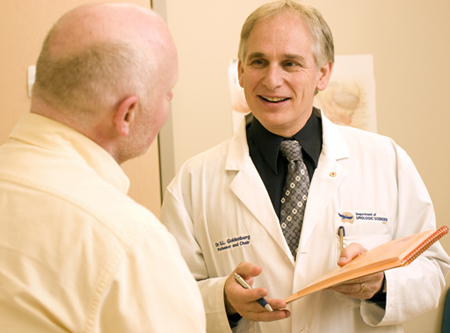
Dr. Larry Goldenberg, urologic surgeon and researcher at the Vancouver Prostate Centre, VGH, and head, UBC Department Urologic Sciences
A new study, co-authored by Dr. Larry Goldenberg, urologic surgeon and researcher at the Vancouver Prostate Centre at VGH and head, Department Urologic Sciences at UBC, has shown that prostate cancer patients who are given a “drug holiday” have the same survival rate as the continuous treatment group, and a far better quality of life. With intermittent periods without androgen suppression therapy, patients experienced reduced side effects, including less severe hot flashes and improved physical, sexual, metabolic, and cognitive function. Intermittent therapy is also significantly cheaper than continuous treatment, at one-third to one-half of the cost of continuous treatment.
Androgen-suppression therapy is commonly given to prostate cancer patients following radiation or surgery, and patients can be on the drugs for their entire lives. In the study, the team of international scientists looked at the health outcomes of 1,386 men with non-metastatic prostate cancer who had previously received radiation therapy, with or without prostatectomy. Half received continuous treatment of androgen suppressing drugs, which is the current standard of care in Canada. The other half received eight months of treatment followed by a break, lasting months or even years before their next course of treatment. Breaks in treatment were determined by the patients’ level of prostate specific antigen (PSA) – a biological marker of the disease – and when they reached a predetermined set-point, drug therapy was resumed.
Vancouver Coastal Health researchers and clinicians at the Vancouver Prostate Centre are pioneers in this field, having begun research and treatment of patients with intermittent therapy since the 1990s. The Centre has been an epicenter for this form of treatment and results from this large-scale study confirm earlier research. The study, which was published in New England Journal of Medicine, September 2012, is expected to impact changes in prostate cancer protocols at other centres across Canada and worldwide.
For more VCH Research stories, visit www.vchri.ca.
